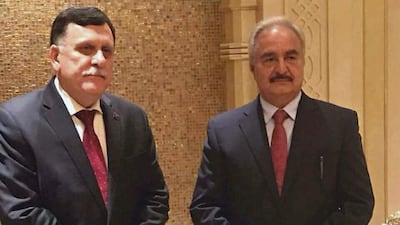The United States has thrown its weight behind a new United Nations plan to bring peace to Libya, backing efforts to end the country’s chaotic civil war.
Washington’s re-engagement with Libya comes after Donald Trump declared on April 21 that America has “no role” in Libya.
The change in US thinking is probably down to concerns about the re-emergence of ISIL forces, which have staged a number of attacks in central Libya during the summer.
“The United States welcomes the September 20 United Nations announcement of an action plan to advance political reconciliation in Libya,” the US State Department said late on Friday. “We strongly support UN facilitation as the Libyan people carry out this critical transition.”
_______________
Read more:
Libya's Paris agreement is all well and good, but can it be implemented?
The rise and rise again of Libya's Field Marshal Khalifa Haftar
Libya rivals Sarraj and Haftar meet face to face in Abu Dhabi
_______________
On August 23, ISIL admitted killing nine soldiers of the Libyan National Army (LNA) at a checkpoint in the central Jufra region. Jufra is south of the coastal city of Sirte, where ISIL units were defeated in December after a six-month campaign by Libyan forces supported by US air strikes.
Diplomats say that since December, ISIL has regrouped in central Libya, taking advantage of the country’s enduring chaos and splits between its armed forces.
It is that chaos that the UN action plan is designed to stop.
The plan was unveiled last seek by Ghassan Salame, the UN special representative of the secretary general, on the sidelines of the UN General Assembly in New York.
Mr Salame, appointed in June as the UN’s Libya envoy, said he has toured Libya, meeting political actors and ordinary people, and that his plan was the fruit of those discussions.
“The action plan was not designed by me, but by the Libyans. They want an inclusive process, a way forward,” he said.
Step one of the plan begins on Tuesday, when delegates from Libya’s two rival governments meet in Tunis.
The delegates are from the High Council of the UN-backed Government of National Accord in Tripoli and its rival House of Representatives parliament in Tobruk.
Their task is to amend the Libya Political Agreement, a proposed transitional constitution which was agreed, but never fully implemented, in November 2015.
The parliament, elected in June 2014, has never voted yes to the agreement, with fierce arguments between it and the GNA over who should control the army.
Libya has not been stable since the 2011 revolution that overthrew former leader Muammar Qaddafi, with civil war breaking out in July 2014 following the House of Representatives elections. Since the start of the civil war, the UN has negotiated without success to find a way to end the fighting.
“A succession of transitions has failed to bring to the Libyan people what they want the most; stable, effective and predictable governance and decent living standards,” said Mr Salame.
The civil war has brought chaos. The UN reports that more than half a million of Libya’s six million population are internally displaced and fighting between rival militias has been raging for the past week in the western coastal town of Sabratha. The capital, Tripoli, is wracked by regular battles between militias, while citizens cope with kidnappings, power cuts and water shortages.
If the Tunis talks end in agreement on an amended political agreement, Mr Salame plans to hold a national conference bringing in all Libya’s factions - step two of his action plan.
In that conference, to be held in Libya, with no date yet set, Mr Salame hopes for support for a permanent constitution, drafted by yet another Libyan authority, the Constitutional Assembly, which would lead to elections for a permanent government within 12 months.
“Within a year from now, we must reach the final stages of the process,” Mr Salame said.
He underlined that the key to the process will be support from the international community. An embryonic peace process has been in the works since May 2, when GNA prime minister Fayez Al Sarraj met Field Marshall Khalifa Haftar, head of the LNA and Libya's most powerful military commander, in talks convened by the UAE in Abu Dhabi in an initiative also supported by Egypt.
The two Libyan figures met again in Paris on July 25 in talks organised by French president Emmanuel Macron, in which Mr Al Sarraj and Field Marshal Haftar discussed an embryonic peace plan.
The Paris talks agreed to disband Libya’s militias and place security in the hands of regular army and police forces, with a commitment to a new constitution and fresh elections, though neither Mr Al Sarraj nor Field Marshall Haftar signed the proposed agreement.
“Past initiatives by member states or groups have been invaluable and we must build upon them,” Mr Salame said.

